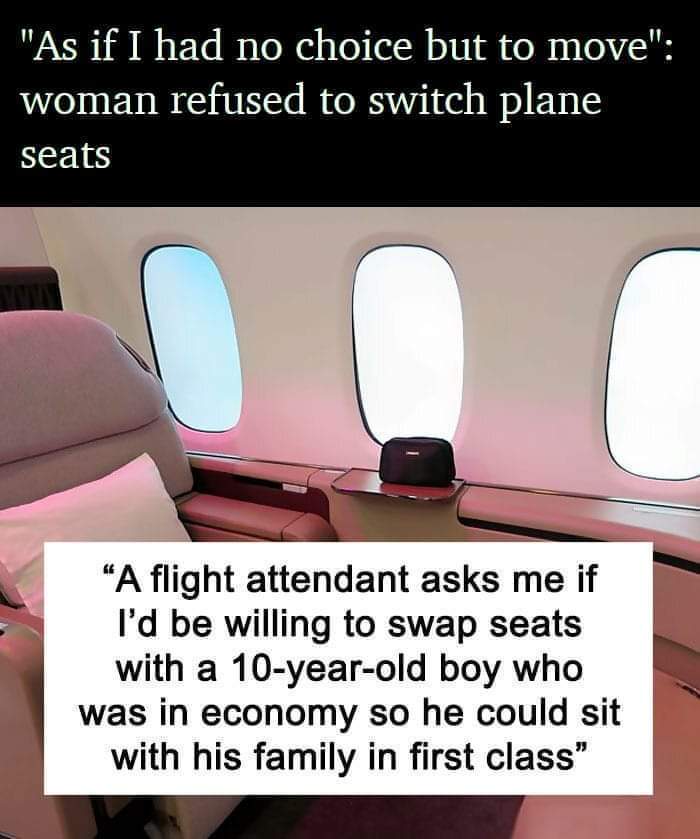Air travel is often fraught with unexpected challenges, and for one 23-year-old woman, a long-anticipated flight to San Francisco presented a moral quandary she hadn’t anticipated. After a year of careful planning and earning a first-class upgrade through her loyalty points, she found herself at the center of controversy when she refused to give up her seat for a 10-year-old boy in economy class.

The situation, which she later shared on Reddit, ignited a heated debate about travel etiquette, entitlement, and personal rights, leaving many divided on who was in the right.
A Surprising Request Mid-Flight
About an hour into the 13-hour flight, a flight attendant approached the woman with an unusual request. The boy, separated from his parents, had been seated in economy while his parents were enjoying first-class upgrades. The parents requested that the boy join them in first class, but doing so would require the woman to relinquish her seat and move to economy.
The airline, attempting to smooth over the situation, offered her compensation options, including a free upgrade on a future flight or a full refund for her current upgrade. Despite these offers, the woman politely declined. She explained that her first-class seat wasn’t a luxury she stumbled into—it was the result of frequent travel, diligent planning, and loyalty to the airline.
Her Reasons for Refusing
In her reflection, the woman shared that she might have reconsidered if the family had paid for their first-class tickets. However, since the family had received complimentary upgrades, she felt justified in keeping her seat. Her efforts to earn the upgrade through loyalty points, she argued, carried weight and shouldn’t be dismissed lightly.
Furthermore, she suggested a practical solution: one of the parents could have swapped seats with the boy, allowing him to remain with family without requiring her to give up her well-earned comfort. She noted that their refusal to consider this option only reinforced her decision.
A Professional Yet Divisive Response
The flight attendant, despite the woman’s refusal, maintained professionalism and assured her that the airline would work on an alternative solution for the family. However, her decision did not sit well with a nearby elderly passenger, who openly criticized her for making a young boy endure a long flight without his parents.
Although the criticism gave her pause, the woman pointed out that the boy was not entirely alone—he frequently walked down the aisle to visit his parents in first class. This observation reassured her that the boy’s separation wasn’t as isolating as it was made out to be.
Divided Opinions Online
After the woman shared her experience on Reddit, it sparked an avalanche of opinions. Many commenters rallied to her defense, praising her for standing firm. “The parents should never have accepted seats away from their kid in the first place,” one commenter wrote. “If they cared so much, they could have swapped seats with him themselves.”
Another commenter emphasized personal accountability: “It’s not her job to fix the family’s poor planning. Either parent could have moved to economy. Expecting another passenger to make that sacrifice is entitled.”
Some speculated that the family might have been trying to game the system to secure all three first-class seats. Others, however, criticized the woman’s decision, labeling it selfish and suggesting that she could have shown more compassion by accommodating the boy’s request.
The Broader Ethical Question
This scenario touches on a larger ethical question: Should passengers who have earned perks through loyalty programs feel obligated to sacrifice their benefits for others? Or should families bear the responsibility for ensuring their seating arrangements, especially when traveling with children?
While some argue that the woman’s decision lacked empathy, others see it as a firm stand for fairness. The situation highlights the complexities of modern air travel, where individual rights often intersect with collective needs. It also underscores how a lack of preparation on one side can unfairly burden others.
Lessons From the Controversy
Ultimately, this incident serves as a reminder of the importance of accountability and planning when traveling. Families, especially those with young children, should prioritize seating arrangements well in advance to avoid such dilemmas. At the same time, passengers who have earned upgrades or perks through loyalty programs shouldn’t be made to feel guilty for enjoying what they’ve rightfully earned.
The incident also underscores the balance between kindness and fairness. While accommodating others is a virtue, it shouldn’t come at the expense of someone’s hard-earned benefits. This delicate balance is a recurring theme in air travel, where personal boundaries are often tested in shared spaces.
The Takeaway
The woman’s refusal to swap seats has sparked ongoing debate, but it ultimately highlights a universal truth: air travel is as much about logistics and planning as it is about navigating the social dynamics of a confined space. Whether one sides with the woman or empathizes with the family, this situation offers a lesson in the importance of preparation, communication, and respect for personal rights.
Travel is rarely without its challenges, but situations like this remind us that mutual understanding and foresight can go a long way in ensuring smoother journeys for everyone involved.





